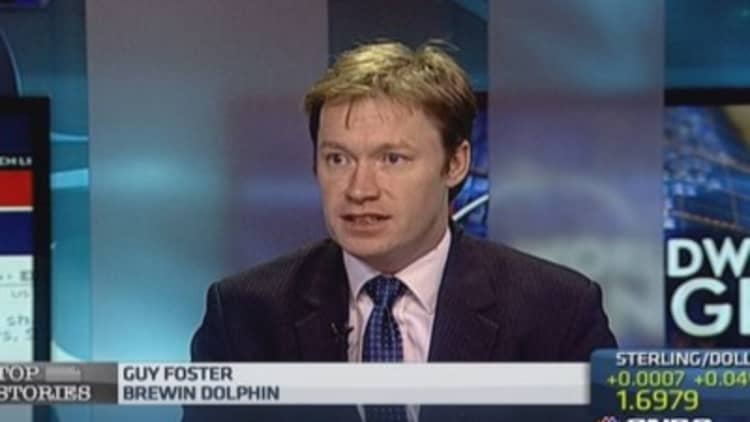The 's powerful rally over the past year seems to have come to an abrupt end and analysts told CNBC the currency faces a further drubbing this year.
The pound rallied 15 percent to a high of $1.7191 in early July from July 2013, on expectations that U.K. central bankers were poised to hike rates for the first time since 2007. However, it has fallen around 2 percent over the past month to trade at $1.6855 in early Asian trade on Thursday.
According to economists at Capital Economics, the recent declines have been motivated by shifting rate hike expectations for both the U.K. and the U.S.
Read More'Overvalued' sterling tipped for a fall
"Investors still seem to be expecting interest rates to rise more quickly in the U.K. than in the U.S.," said Capital Economics in a note published Wednesday.
"In contrast, we think that the larger amount of spare capacity and greater fiscal drag in the U.K. will allow the MPC (Monetary Policy Committee) to raise rates more gradually than the FOMC (Federal Open Markets Committee), which suggests that there is scope for sterling to continue to weaken," they added.
Emma Lawson, senior FX strategist at National Australia Bank told CNBC she also saw further weakness in the pound this year.
"We see the pound at $1.64 by year end. Much of this is based on the U.S. dollar recovery which is driven by an improvement in the U.S. economy and the prospect of the Fed raising rates in 2015," she said.
"While the U.K. economy has improved and we see the BoE may raise rates by year-end, much of this is priced into the pound at present levels," she added.
Most analysts expect a U.K. rate hike from the current record low of 0.5 percent to come either later this year or early 2015.
Read MoreWhat a breakaway Scotland means for sterling
Although expectations for a hike have been firmly entrenched for a while, more recently divided opinions emerging from the Bank of England's (BoE) MPC have led to some confusion.
Some MPC members think the time is coming to ease stimulus after unemployment fell to 6.5 percent in the three months to May from 7.8 percent a year earlier. However, others are worried about slow wage growth, which they think could take a while to push up inflation, which was below target at 1.9 percent in June.
Earlier this month, John Longworth, the director general at the British Chambers of Commerce, told CNBC that the BoE should hold off raising rates for as long as possible to help protect businesses and prevent choking the nation's export recovery.
Many British businesses - including AB Foods, the owner of Primark – have complained that the strong sterling is having an adverse effect on trading.

Other analysts told CNBC that more hawkish chatter from the central bank could trigger a rebound for the British pound.
"Some policymakers believe that it would be prudent to raise rates early to ensure that the process is smooth and gradual," said Kathy Lien, managing director of BK Asset Management in a note published Wednesday.
Read MoreSterling hits six-week low, kiwi sours on dairy worries
"While there's zero chance of a rate hike in August, there's definitely more hawkish chatter that could make its way into next week's inflation report. Of course, we will get none of that tomorrow but it is important to think ahead," she added, referring to the BoE's MPC announcement due Thursday.
Capital Economics added that investors pricing in a sooner-than-expected U.S. rate hike is also a contributing factor to sterling weakness. Once the U.S. hikes rates, the dollar is likely to strengthen, meaning currencies traded against it – like the pound – could get bruised.
A Reuters poll of 55 economists has concluded that the BoE will keep rates on hold at 0.5 percent on Thursday.


